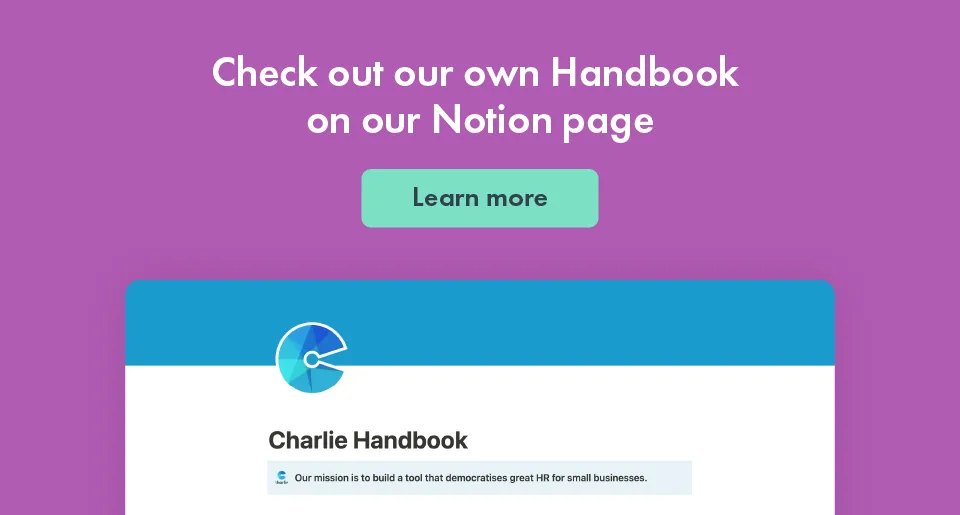Employee handbook – example and best practices for your business

Getting an employee handbook in place that fits your specific business context is an important step for your small company. With the right handbook, you can make sure your business is legally compliant and begin to codify your unique company culture.
What is an employee handbook?
An employee handbook is a guide that companies provide for their teams to set out useful information about working at the business. Employee handbooks can also be called an employee manual, a company handbook or a staff handbook, but they all mean the same thing.
The employee handbook is often one of the first things a new starter will receive when they first join a company. They’re designed to be a great first introduction to their new role, but the best employee handbooks are useful for current team members too whenever they want to check some information.
Not time to read this? Simply have a look at our employee handbook on Notion – we made it available to everyone for free.
4 Best practices for your employee handbook
Like we do at Charlie, here are the 3 best practices you should put into place when it comes to your employee handbook:
- First, create an employee handbook – you can't do anything without one and you will be at risk of legal issues if you don't
- Have a clear vision of what you stand for, what the company values are and get the knowledge you need from outside when it comes to employment law if needed
- Always give new hires access to the company handbook on their first day and throughout their time at the company
- Don't leave your employee handbook in a corner, update it regularly and reflect on it whilst keeping everyone informed of any changes
Why should you have an employee handbook?
At Charlie, a small business with around 50 people, we make our staff handbook available to all of our team members directly in our software and we update it regularly depending on when we change our policies.
We like to think this is a really great way to empower our team to be autonomous when it comes to learning more about the company, but that's not the only reason. A handbook can also be handy to:
- Make sure your team is kept up to date on HR policies and have a clear idea ofstands what the dos and dont's
- Have a unique place to seek information and answers
- Free up some of your time so you don't have to answer questions
- Ensure you stay compliant with the mandatory policies for your business
But also, don't forget this is needed to follow HR compliance – check out our HR compliance checklist for more info.
What should an employee handbook include?
As we just saw, an employee handbook usually covers a lot of different topics but the benefits of putting all that information together usually fall into three camps:
1- Three mandatory HR policies required by UK law
UK employment law requires every business to have three specific HR policies on file to be HR compliant. Those three policies are:
- A Health and Safety policy
- A Disciplinary policy
- A Grievance policy
This law applies to every company in the UK (including very small teams and startups) so if you haven’t got these in place it’s a good idea to get them sorted as soon as you can.
2- HR policies to give you legal cover
When it comes to employee handbooks, just complying with the law is the bare minimum you should be aiming for.
The very best employee handbooks also contain procedures to escalate and investigate any potential issues that may arise.
Your employee handbook is also a great way to protect your business against unfair dismissals or discrimination claims that may be brought up against you.
By building strong HR policies outlining the steps for each situation, you will be less at risk of legal action.
3- The values your company standsaction for
An employee handbook should set out exactly what a company believes in, how its team approaches their work, and the mission the company strives to fulfil.
4 - Forward-thinking HR policies
That’s why the best employee handbooks contain far more than just the three policies required by the law. Companies that take their working environment seriously understand that there’s far more to employeeworkweek handbook.
Here's a sample of a few policies we have at Charlie to give you an example:
- Parental leave policy
- Remote working policy
- Adjusted workweek policy
- Personal days policy
- Sabbatical policy
- Pay and promotion policy
- Parental bereavement and pregnancy loss policy
- Mental health policy
- Sick days policy
- Holiday policy
- DE&I policy
4 - Code of conduct and behavioural expectations
The last aspect of your company handbook, but not the least is how you expect your employees to behave at work and the code of conduct you want them to respect.
That can include a myriad of elements such as dress code, alcohol and drug policy, conflict of interest, etc.

How to create a company handbook based off Charlie's own one
Putting together an employee handbook for small businesses on your own is definitely possible.
That's why we've decided to share all of what's included in our own employee handbook to help you make the right choice for your business.
This is based off a template that's available below if you need it. We'll give you the right details section by section.
But if you're not sure whether this is a job for you or not, you can also get in touch with our qualified HR advisors to create the right handbook for you.
1. Welcome to Charlie – about us and the code of conduct
This section allows us to set the right tone of voice and help our new joiners understand our journey:
- Where the business started from and the different steps we took to arrive where we are now, including pricing changes and ways of working
- The way we work including the different cycles, company priorities, tactics and the way we organise the year as well as our teams
2. Time off policy at Charlie – how we deal with each type of leave at Charlie
This section outlines each of our time off policy to give clarity to our team:
- Our sick leave policy allows for 20 days full pay, 20 days at 50% pay and 20 days at 25% pay on a rolling basis – these are also day that support mental health, not just physical health
- Our personal days policy where team members to take 4 days off per year with no questions asked when they're feeling off
- Our sabbatical policy which lets team members take one month paid leave at 50% of their salary after they've been with Charlie for 3.5 years
- Our parental leave policy outlines the details of what we offer including 10 weeks of fully paid leave and 10 weeks paid 50% of your salary for new parents
- Our holiday policy describes the do's and don'ts when booking holidays and our limit of 25 days per year excluding bank holidays
- Our bereavement policy gives people the opportunity to take time off when they lose a member of their family or a close friend
- Our parental bereavement and pregnancy loss policy allows for time off for people who have encountered a loss of pregnancy
3. Flexible working at Charlie – understanding how our team members can work
These are guidelines that everyone must follow to ensure we remain a fully flexible company.
- Our approach to structured flexibility where we allow our team to have control over their lives and choices, ownership over their work and making sure they create a sense of belonging and connection with other members of the team
- Our hybrid-first policy allows us to optimise for office and remote working to be valued equally and to be equally valuable – which means everyone can work wherever they wish to as long as it's in the UK whilst optimising for meet-ups
- The way we expect our team to structure their day with flexibility over working hours and how it's possible to create a routine
- Our mandatory meet-ups two times per year where the whole team gets together to reflect on how the year has gone so far and have some well-deserved fun
4. Personal Development at Charlie – how we take care of growth, L&D and career progression
- Our approach to L&D and how it's a big part of our culture
- Our high-performance behaviours are a set of behaviours that we expect each team member to abide by – these are getting uncomfortable, being humble, giving energy and driving for results
- Our pay and promotion policy highlights in detail what we are committed to when it comes to paying our employees and what rules we have in place to ensure this is done fairly
- Our progression framework lays out a clear salary and career progression pathway for all of our team members and what we expect from them at each level
- The personal development time we allow each team member to have per week where they can catch up on reading, webinars or other items
- Our exploration days where, once every three months, we allow team members to work on projects that are outside of their day-to-day role
- The budgets we allocate towards the personal development opportunities at Charlie
5. Mental health and DE&I – how we support our team members
This section is an important one that includes all the ways you can expect support from Charlie, as well as the initiatives we put in place to remain as objective as possible from recruitment to promotions.
- Our approach to mental health and how we support our team members
- Our mental health policy explains our commitment and procedures towards mental health
- Our DE&I policy ensures we maintain a high level of commitment towards respecting and treating each team member equally whilst reinforcing rules and initiatives to reduce biases
- Our inclusive language policy gives examples and rules as to how we use language to avoid biases, prevent the exclusion of groups and individuals and create a workspace we’re all proud of
Employee handbook example – take inspiration from Charlie
There are all sorts of templates available online that you can copy and paste into your own version.
However, if those templates are simply used for a copy-paste job, there's no chance you'll get much out of it.
At Charlie, we made our handbook public for two reasons:
- To help you build your own employee handbook with concrete examples from policies we are using at our company
- To promote essential policies on the ones you need to stay legally compliant
Simply have a look at our Notion page below or build your own on our very own software – start a free trial today to have a look.

Go further by getting familiar with employee handbook examples
Of course, Charlie is not the only company that has made their handbook public. Want to go further and have a read at what others are doing? Here's a list:
- Netflix – a good example of what a massive company like Netflix can do
- Hubspot – employee culture code for marketing giant Hubspot is available
- Trello – smartly hosted on their own product, Trello gives full access to what they offer
Employee handbook template – download now
And if you want to craft your own employee handbook, we've also created this guide that can act as an employee handbook template for your business.
Here's what you'll find in it:
- Ticking off legal requirements and best practices (think about your procedures such as issuing a written warning template, gross misconduct processes or setting probation periods)
- A handbook your team can rely on
- A handbook to help you scale your team and grow your business
- Make it easy to find your handbook
- Keeping your handbook up to date
Simply click on this link and download it today.


